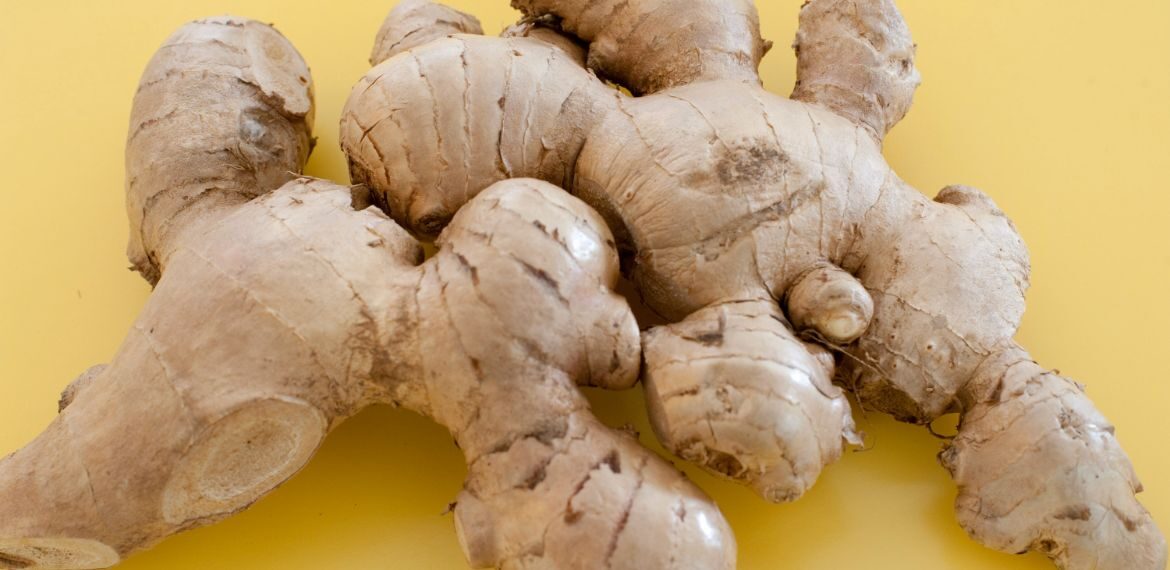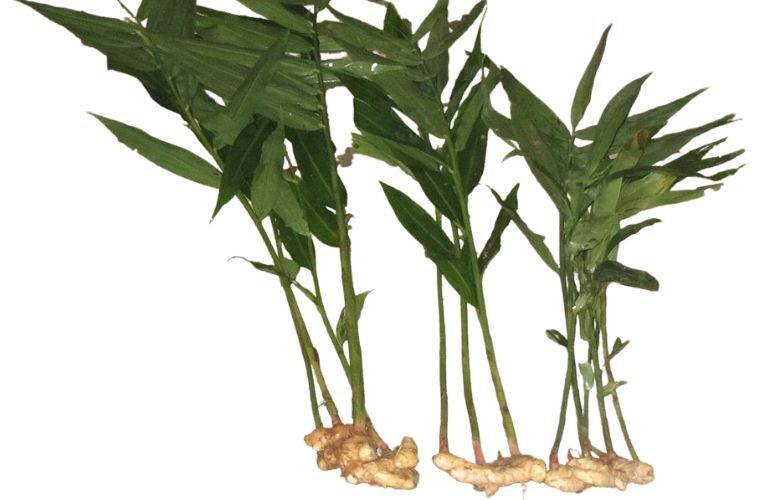Identification
Ginger plant can be identified with following characteristics:
- Leaves: Ginger plants have long, slender leaves that are typically around 6-12 inches long. They are usually a medium to dark green color and have a pointed tip.
- Stems: Ginger plants have thick, fleshy stems that grow horizontally just below the surface of the soil. These stems are called rhizomes, and they are the part of the plant that is typically harvested for use in cooking or medicinal purposes.
- Flowers: Ginger plants produce small, yellowish-green flowers that grow on a stalk that emerges from the center of the plant. The flowers are often hidden among the leaves and are not very showy.
- Smell: Ginger plants have a distinctive spicy aroma that is often described as warm and earthy.
Various parts of the ginger plant are used for medicinal purposes, including:
- Rhizomes: The rhizomes, or the fleshy underground stems, of ginger plants are commonly used for medicinal purposes. They contain compounds called gingerols and shogaols, which have anti-inflammatory, antioxidant, and antimicrobial properties. Rhizomes are typically dried and ground to make ginger powder, which can be used in teas, capsules, or added to food.
- Leaves: The leaves of ginger plants are sometimes used in traditional medicine to treat pain and inflammation. They contain compounds similar to rhizomes, including gingerols and shogaols.
- Flowers: The flowers of ginger plants are sometimes used in traditional medicine to treat asthma, coughs, and bronchitis. They contain essential oils that have antispasmodic and expectorant properties.
- Seeds: The seeds of ginger plants are sometimes used in traditional medicine to treat digestive issues, such as bloating and gas. They contain compounds that have carminative properties, which can help to relieve gastrointestinal discomfort.
Common Name
Ginger
Scientific Name
Zingiber officinale
Name in popular languages
- Spanish: Jengibre
- French: Gingembre
- German: Ingwer
- Italian: Zenzero
- Portuguese: Gengibre
- Russian: Имбирь (Imbir’)
- Arabic: زنجبيل (Zanjabeel)
- Chinese: 姜 (Jiāng)
- Japanese: ショウガ (Shōga)
- Hindi: अदरक (Adrak)
- Bengali: আদা (Ada)
- Gujarati: આદુ (Adu)
- Kannada: ಶುಂಠಿ (Shunti)
- Malayalam: ഇഞ്ചി (Inchi)
- Marathi: आले (Ale)
- Tamil: இஞ்சி (Inji)
- Telugu: అల్లం (Allam)
Origin and History
The Ginger plant (Zingiber officinale) is believed to have originated in Southeast Asia, and it has been used for its medicinal properties for thousands of years. It was cultivated in India and China as early as 500 BC, and it quickly became popular for its various health benefits.
In ancient times, ginger was used as a digestive aid, to treat nausea, and to relieve pain and inflammation. It was also used as a remedy for respiratory problems and as a natural remedy for menstrual cramps. Ginger was also used in Ayurvedic medicine and traditional Chinese medicine to treat a wide range of health conditions, including headaches, arthritis, and rheumatism.
During the Middle Ages, ginger became a valuable commodity and was traded throughout Europe and the Middle East. It was used to make a variety of remedies, including tonics and syrups, and was also used as a spice to flavor food.
In modern times, ginger continues to be used for its health benefits. It is used to relieve nausea and vomiting, to reduce inflammation and pain, and to improve digestion. It is also used as a natural remedy for cold and flu symptoms, and it has been shown to have antioxidant and anti-cancer properties.
In short, the Ginger plant has a long history of use for its medicinal properties, and it continues to be a popular natural remedy for a variety of health conditions today.
Nutritional constituents
The Ginger plant contains several important nutrients, including carbohydrates, fiber, protein, vitamins, and minerals. Some of the key nutritional constituents of Ginger are:
- Carbohydrates: Ginger contains complex carbohydrates, including starch and fiber, which provide energy and support digestive health.
- Protein: Ginger also contains small amounts of protein, which is important for building and repairing tissues in the body.
- Vitamins: Ginger is a good source of several vitamins, including vitamin C, vitamin B6, and vitamin E. These vitamins play important roles in supporting immune function, maintaining healthy skin, and reducing inflammation.
- Minerals: Ginger is also rich in minerals like magnesium, potassium, and manganese, which are important for maintaining strong bones and supporting heart health.
Medicinal or Health Benefits
The Ginger plant (Zingiber officinale) is widely known for its medicinal and health benefits. Here are some of the key health benefits of Ginger:
- Anti-inflammatory effects: Ginger contains compounds that have anti-inflammatory effects, which can help reduce inflammation and pain in the body.
- Digestive support: Ginger is known to support digestion and relieve nausea and vomiting, making it a useful natural remedy for conditions like morning sickness and motion sickness.
- Immune support: Ginger is known to have immune-boosting effects, which can help protect the body against infections and disease.
- Anti-cancer properties: Some studies suggest that Ginger may have anti-cancer properties, and may be useful in the prevention and treatment of certain types of cancer.
- Heart health: Ginger is known to have beneficial effects on heart health, including reducing blood pressure and improving cholesterol levels.
Overall, Ginger is a valuable natural remedy that can be used to support overall health and well-being.
Scientific Perspective
There is a significant body of scientific research on the health and medicinal benefits of Ginger (Zingiber officinale). Here are some examples of scientific studies on Ginger:
- Anti-inflammatory effects: A study published in the Journal of Medicinal Food found that Ginger had anti-inflammatory effects and could be useful in the treatment of conditions such as osteoarthritis.
- Digestive support: Research published in the Journal of Ethnopharmacology showed that Ginger could be an effective treatment for nausea and vomiting associated with chemotherapy.
- Immune support: A study published in the Journal of Nutrition found that Ginger had immune-boosting effects and could help protect against respiratory infections.
- Anti-cancer properties: Research published in the Journal of Agricultural and Food Chemistry showed that Ginger had anti-cancer properties and could be useful in the prevention and treatment of cancer.
- Heart health: A study published in the Journal of Cardiovascular Pharmacology found that Ginger could help reduce blood pressure and improve cholesterol levels.
These are just a few examples of the many studies on the health and medicinal benefits of Ginger. Overall, the evidence suggests that Ginger is a valuable natural remedy that can be used to support a range of health conditions.
FDA's perspective
The US Food and Drug Administration (FDA) classifies Ginger (Zingiber officinale) as a dietary supplement, which means that it is not regulated as a drug. However, the FDA does provide guidance on the safety and labeling of dietary supplements, including those containing Ginger.
While Ginger is generally considered safe and has a long history of use as a natural remedy, it is important to use caution and follow FDA guidance when using dietary supplements containing Ginger or other natural products.





